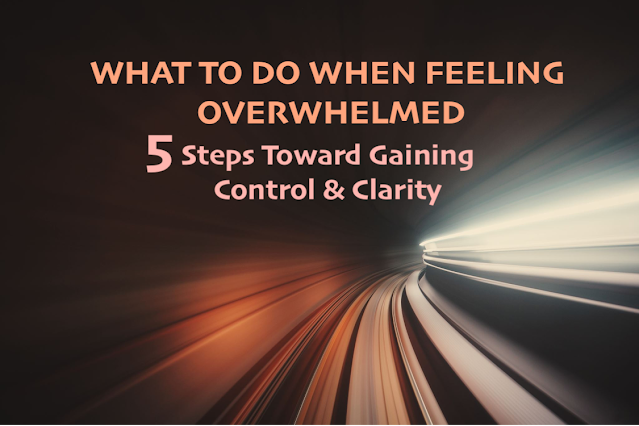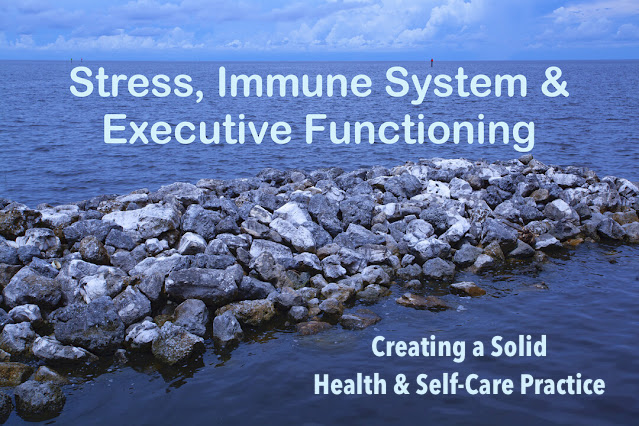WHAT TO DO WHEN FEELING OVERWHELMED? 5 Steps Toward Gaining Control & Clarity
The speed feels relentless and the demands are escalating exponentially.
Almost everyone can identify with the pressure of the feeling of overwhelm. Too much to do and not enough time! The question, in that moment, becomes- What do I do?
Unless we are talking about circumstances in which your training has prepared you for rapid-fire decision making and execution, such as working in the emergency room or on military special operations missions, your personal situation in which you are feeling the stress of overwhelm is likely due to a life that has snuck up on you. Your To-Do list that once felt manageable has now grown to include a plethora of responsibilities with strict deadlines that you did not entirely anticipate. Or, an unexpected and serious situation developed that will now require your attention and time, and subsequently a pivoting and shifting of your day-to-day schedule that was already full prior to this crisis.
But for now, you're in need of control and clarity and under the weight of the exorbitant pressure, you're freezing. Nothing other than growing feelings of anxiety and panic are happening.
What Can You Do?
Immediate Steps
1. PUSH THE PAUSE BUTTON: Push it quickly. Stop and assess. If there's time, go for a walk or some other simple physical activity that will help create distance between you and the overwhelming feelings. If your walk or physical activity can include being outdoors in nature, then you accrue bonus points.
2. BREAK IT DOWN: Grab a blank sheet of paper and jot the situation down. Break down the challenging or complex set of tasks. Continue to break them down further, until they become smaller and smaller. View your list and quickly organize and prioritize what needs to be addressed immediately.
3. BREATHE: Give yourself time to take a few, deep diaphragmatic breaths. This will help bring restoration to your nervous system.
Here is a basic guide to accessing this breath:
- get into a comfortable seated position.
- breathe in through your nose and exhale through your mouth. Imagine you are fogging a mirror with your breath.
- when breathing, inhale to contract the diaphragm to create space for your lungs to expand, and when you exhale, relax the diaphragm and gently push the air from your lungs.
- inhale and exhale to a slow count of 4
- get into a comfortable seated position.
- breathe in through your nose and exhale through your mouth. Imagine you are fogging a mirror with your breath.
- when breathing, inhale to contract the diaphragm to create space for your lungs to expand, and when you exhale, relax the diaphragm and gently push the air from your lungs.
- inhale and exhale to a slow count of 4
Now that you have hit the pause button, broken down the tasks on paper, and breathed, take immediate action. Get started doing something; especially the tasks you prioritized as being most important. Keep working your way through your list. As you move forward and are keeping a tally on what is still left to do, balance this with looking back at all you have completed. This will help combat feelings of fatigue and defeat and bring about momentum and motivation.
Acknowledge 5 things you see.
Acknowledge 4 things you can touch.
Acknowledge 3 things you can hear.
Acknowledge 2 things you can smell.
Acknowledge 1 thing you can taste.
Not So Immediate but Important Steps
I am a
human BE-ing
not a
human Do-ing
The information presented in this blog is intended for general knowledge and is not a substitute for medical advice or treatment. As with most things in life, there isn't a magic pill or "cure-all" but there are strategies to help regain control of your life.
Quiet your mind.
Energize your body.
Reclaim your sense of peace.
If you enjoyed this article and would like to read more, then let's connect:
FACEBOOK: Marie Therese Rogers
Atlantic Behavioral Health Professionals
Life in Focus
LINKEDIN: Marie T. Rogers, Ph.D.
INSTAGRAM: Mariethereserogers
YOU ARE ALSO INVITED TO LISTEN TO THE LIFE IN FOCUS PODCAST ON APPLE AND OTHER STREAMING DEVICES.
To order on BOOKBABY, click here











Overwhelm has become a staple in many of our lives because we wear so many hats. Thank for these strategies for handling overwhelm with grace.
ReplyDeleteThank you.
DeleteThank you for being vulnerable and helpful, great post!
ReplyDeleteThank you.
DeleteWhat a helpful article! As a fellow mental health professional (I'm an LCSW) I appreciate all of your suggestions and ideas. I've suffered from burnout before which was very hard to recover from and put together a strategy to help others https://pantearahimian.com/how-to-cure-burnout-13-strategies-to-help-you-reset/
ReplyDeleteThank you for reading and commenting. The APA recently published a study on mental health professional burnout. It's happening at alarming rates.
DeleteI love the grounding technique that you shared. This will be great to teach my kids.
ReplyDeleteThank you.
DeleteThis comment has been removed by a blog administrator.
ReplyDeleteMy daughter has taught my young grandson to use the grounding method to calm himself and I can say it is effective.
ReplyDeleteWhat a wonderful gift!
DeleteSuch a helpful article. We always need to remind ourselves to put the brakes on our crazy lives and just relish a moment. Thanks for sharing.
ReplyDeleteThank you!
DeleteI love deep breathing to help me to destress.
ReplyDeleteThank you for sharing. You made important points and have great suggestions. 😊
ReplyDeletePastor Natalie (ExamineThisMoment)
Letstakeamoment.com